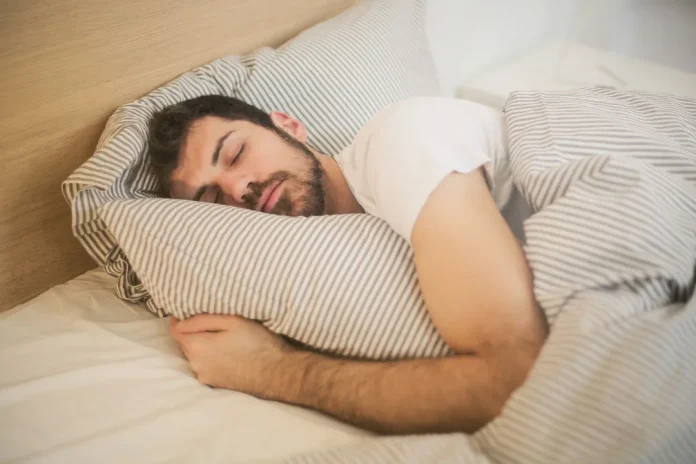It may surprise you to learn that REM sleep and depression are linked and that REM sleep deprivation may have a negative effect on mood. But can getting more deep sleep and REM sleep really help boost your mood? We’ll answer this question and tell you how you can get more deep sleep.
Sleeplessness and depression are bidirectionally related: just as depression can induce sleeplessness, so too can sleeplessness bring about depression. In fact, research has estimated that anywhere from 75-90% of people with depression have sleep quality issues, while people with insomnia have a “tenfold higher risk” of developing depression than those who enjoy a sound sleep.
This inextricable relationship can make it difficult to discern which came first, and creates a vicious cycle in which sleeplessness begets depression and vice versa, continuing ad infinitum. We all know sleep is essential, but understanding the effects that sleep and mood have on each other is crucial to maintaining proper health. Keep reading to discover more about the relationship between the two, as well as how to improve your sleep and put an end to the infinite regress of uneasy thoughts and restless dreams.
REM Sleep and Depression: How Getting The Right Kind Of Sleep Can Boost Your Mood is an original (OptimalPerfomanceLiving) article.
REM sleep and depression:
A healthy sleep cycle
A good night’s sleep includes several phases – Rapid Eye Movement (REM) and Non-Rapid Eye Movement (NREM) – that occur in five distinct stages: Wake, N1, N2, N3, and REM. If we are sleeping properly, we move through each stage progressively in roughly four to five cycles each night.
One healthy cycle takes approximately 90 to 110 minutes to complete and occurs in the order of N1, N2, N3, N2, and then REM. In N1, we transition from wakefulness to sleep, while in N2, body temperature drops and heart rate lowers. N3 and REM are considered “deep sleep.”
In the former, your muscles relax and your blood pressure and breathing rate drop, while in the latter, there is an increase in brain activity and vivid dreaming. Approximately 75% of our nightly sleep occurs in the N1 to N3 stages, with the first period of REM being short. But as the night progresses, we spend more time in REM.
REM sleep and depression:
The benefits of REM, deep sleep and their effect on mood
The benefits we associate with truly restful sleep largely occur in the later cycles N3 and REM. Upon entering deep sleep, the body repairs itself, heightens the immune system, improves metabolism, induces weight loss, and facilitates memory and learning. REM is especially important and unique in the sleep cycle writ large, as it plays an essential role in memory consolidation, brain development, and emotional processing.
During REM, our brain regulates the emotions we associate with events in our life. A 2011 study showed that during REM, there is a massive reduction in activity in the amygdala, where the brain processes emotions, among other functions. This allows for the brain to “(re)process and depotentiate previous affective experiences, decreasing their emotional intensity.”
As the brain is consolidating memories and growing neural networks, it is also processing emotions, and, rather significantly, “dampening,” as one study suggests, the consolidation of negative ones.

REM sleep and depression:
Sleep cycles, interrupted
When REM sleep is interrupted then, and we don’t cycle through properly, the results can be severe for our mood. In fact, a 2019 meta-analysis of studies concludes that “there was a greater impact of sleep loss on emotions than on cognitive or motor function.” Because REM plays such a large role in the maintenance of our cognitive skills – including regulating emotions and behaviors – our ability to respond to stress is greatly compromised.
And more significantly, disturbing REM sleep actually increases the consolidation of negative emotions and thoughts; indeed, research has shown that there is a relationship between lack of sleep and reported “poorer perceptions of life quality and mood.” Inversely, that same research also indicates that poor sleep quality is, in fact, one of the identifying factors by which individuals recognize and seek treatment for depression.

REM sleep and depression:
DELTA BrainLuxury is the premier sleep supplement
You might be wondering, then, how to maintain equilibrium and offset the vicissitudes of depression and sleeplessness. Enter DELTA BrainLuxury. Their formula supports natural sleep and “contains the fatty acids and amino acids your brain needs to perform at its optimum.” DELTA is not a sleep agent itself, but rather a product with the essential nutrients and ingredients needed to help your brain enter and remain in deep sleep.
The ingredient list is consequently extensive, with attention given to both the respective effects of each ingredient, as well as “their interactions and co-dependencies.” It contains ingredients such as glycine and tryptophan, which help your brain naturally produce melatonin and serotonin, while its inclusion of DHA, EPA, and glycine, helps you calm down.
DELTA also includes omega-3, a fatty acid with anti-inflammatory properties that extends the deep sleep stages of the sleep cycle, allowing the brain to build stronger neural connections; it is also linked to improving depression by interacting with mood-related parts of the brain. To that end, DELTA Brain Luxury reports that 84% of users noted “an improvement in mood and feeling better in the morning.”

How to re-establish a healthy sleep cycle
Because REM sleep and depression are bidirectionally related, treatment can be difficult. And despite their entanglement, treatment for lack of sleep and depression is particular to each symptom; there is not a cure-all that will fix both simultaneously.
But, that doesn’t mean it’s completely out of your hands. You can help improve your sleep with simple lifestyle changes, like establishing a consistent wake-up time, regularly exercising, limiting caffeine and alcohol, or even getting more sunlight.
Some at-home methods to help improve depression also include regular exercise, eating healthy, and avoiding alcohol. These are not definitive cures, and depending on the severity of your symptoms, you should consult your doctor. However, if you’re looking to re-establish equilibrium in your sleep cycle and mood, and once again enjoy a restful night’s sleep, they’re a good starting point.

Further Reading for Additional Reference:
The Atlantic: Dreaming, Depression, and How Sleep Affects Emotion
Nature: Sleep, insomnia, and depression
New Scientist: Getting just 6 hours of sleep is linked to mental health issues
Important Note: The information contained in this article is for general informational purposes only, and should not be construed as health or medical advice, nor is it intended to diagnose, prevent, treat, or cure any disease or health condition. Before embarking on any diet, fitness regimen, or program of nutritional supplementation, it is advisable to consult your health care professional in order to determine its safety and probable efficacy in terms of your individual state of health.
Regarding Nutritional Supplements Or Other Non-Prescription Health Products: If any nutritional supplements or other non-prescription health products are mentioned in the foregoing article, any claims or statements made about them have not been evaluated by the U.S. Food and Drug Administration, and such nutritional supplements or other health products are not intended to diagnose, treat, cure, or prevent any disease.
